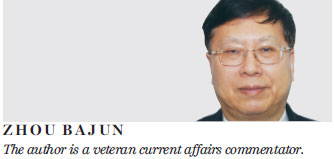Most Hong Kong youth not radicalized by 'Occupy'
Updated: 2015-01-14 06:03
By Zhou Bajun(HK Edition)
|
|||||||
More than two months of "Occupy Central" protests have left Hong Kong with even greater challenges in dealing with the problems facing its younger generation. These include constitutional reform, economic development and improving people's livelihoods. To seek solutions to these issues the government and community must first correctly diagnose the problems.
On Dec 10, 2014, only a day before Hong Kong police cleared the protest barricades in Central and Admiralty, the Wall Street Journal published an article headlined "Political Generation Rises in Hong Kong". The authors said the legacy of "Occupy" "may lie not in the reforms it called for, but in the generation it pushed to act".
However, Hong Kong authorities estimate that only 10 percent of the city's university students, and less than 10 percent of secondary school students, attended the protests. It is therefore inaccurate to say a political generation is rising up in Hong Kong.

Today in Hong Kong, the younger generation (like the older generation) is divided between pro-opposition and pro-establishment groups. While some radical students were protesting in the streets for what they call "genuine universal suffrage", many moderate ones were studying and were opposed to "Occupy". The Hong Kong Federation of Students only represents some of the city's university students. Scholarism is a small group representing a small number of secondary school students. Moreover, the patriotic student organizations tend to keep a low profile. The government should encourage them to participate more in socio-political movements to help Hong Kong's long-term stability and prosperity.
The article, "Mainland travel ban on protesters is 'burning bridges' with Hong Kong youth" published on Dec 11, 2014 in the South China Morning Post, was also inaccurate when it said, "Beijing has completely lost the support of young Hong Kong people by banning students from entering the mainland amid the 'Occupy Central' protests, say two students who shared the experience of being denied entry."
This is an exaggeration. The reality is mainland authorities only dealt with those Hong Kong students who participated in "Occupy" - a few student leaders were denied entry into the mainland, while others have been only temporarily restricted.
The youth leaders involved in the protests believe they know enough about the mainland and, particularly, what mainland young people thinks about issues. But as Nathan Gardels, editor-in-chief at the WorldPost, wrote On Dec 5 last year, "If the sharply contrasting views of students in Xi'an or Beijing, and Hong Kong are any indication, Deng Xiaoping's ideal formulation of 'One Country, Two Systems' has morphed into another reality: One Country, Two Dreams." The sharp contrast between mainstream mainland university students' patriotism and some Hong Kong students' pro-opposition politics may be exaggerated. However, the mainland youth who astonished these Western reporters would also be surprised by their Hong Kong counterparts' calls for Western-style democracy.
What has led many Hong Kong students to blindly worship Western democracy? The main reason is the city's education system. Since the handover, the humanities have not been compulsory in Hong Kong schools. They have been secondary to skills necessary to sustain the economy. Consequently, the younger generation knows much more about business management than about Chinese history; students lack any real knowledge of modern China. More seriously, while the opposition attacks national education as "brain-washing" the mainstream media, as well as schools, continuously instill Western ideology into the younger generation.
The second serious problem is a demographic phenomenon - the "Me" generation. Hong Kong experienced a golden 30-year period of economic development from the 1970s to 1990s. For youngsters growing up in 1990s, their parents adopted a relaxed approach to raising them. They offered them a lot of freedom. Therefore, many youngsters became the "Me" generation.
The "Me" generation believes the world revolves around only them. Armed with a sense of entitlement, they are often bewildered when things happen out of sequence, spoiling their impression of an orderly, subservient world. The young people themselves, under the guidance of their parents, teachers and the authorities, need to change this misplaced sense of entitlement.
The government has been accused of failing to provide young people with a positive view of their future. Indeed, economic stagnation has reduced upward social mobility, affecting many young people's career prospects. An endless rise in property prices has destroyed many young people's dreams of owning a home. The government has a responsibility to promote economic development and build more public housing units in order to control the property market.
(HK Edition 01/14/2015 page1)